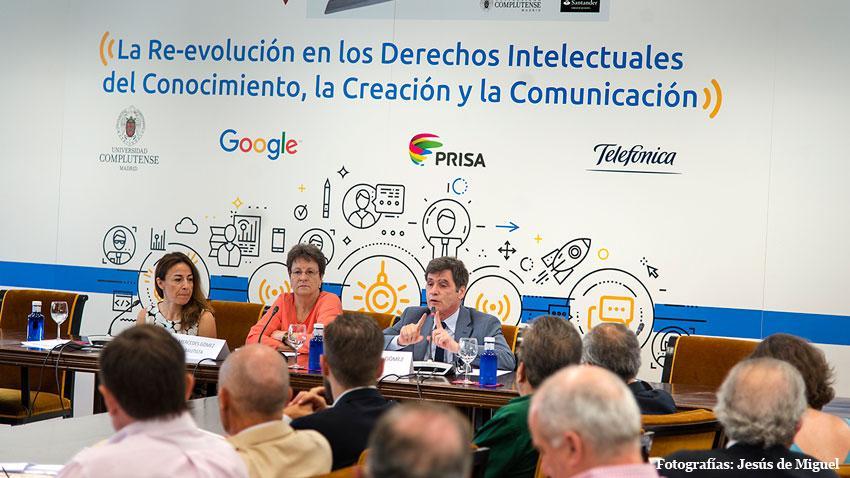News
Hacia la transformación digital sostenible
15-07-2016

A revolution always wreaks havoc. And the enormous digital changes that we are witnessing are no exception. There may not be any barricades in the streets or class struggle. But the consequences of the triumph of the Internet are of such a magnitude that the world of culture is still asking itself, every day, about how to go about building a sustainable future that is respectful of copyright. In search of answers, experts, academics and entrepreneurs came together in Madrid on July 12 and 13 for the course "The re-evolution in intellectual rights affecting knowledge, creation and communication"organized by the Grupo PRISA (publisher of this newspaper), the Complutense University, Google and Telefonica.
COME WRITERS AND CRITICS WHO PROPHESY WITH YOUR PEN AND KEEP YOUR EYES WIDE THE CHANCE WON'T COME AGAIN,” SANG BOB DYLAN IN THE TIMES THEY ARE A CHANGIN. HIS VOICE AND HIS GUITAR FILLED THE ROOM BEFORE THE COURSE STARTED AND IT WAS AN APT CHOICE. "WE ARE FACING A TSUNAMI. AND THE FIRST WAVE HAS ALREADY FORCED US TO MAKE A HUGE EFFORT," SAID NOELIA FERNÁNDEZ, PRISA’S CHIEF DIGITAL TRANSFORMATION OFFICER.
Today there youtubers with more followers than time-honored media outlets, reports are made in virtual reality, music is listened to less and less on CDs and you can watch (or shoot) a movie on a mobile phone. Yet at the same time, the publishing and film industries still draw most of their revenue from traditional channels: movie theaters and print books. The digital re-evolution does not bow to golden rules or formulas. The world has changed and it continues to change, making the challenge of adapting to it even more difficult, and raising uncertainty.
Given these doubts, the course brought together speakers such as Victor García de la Concha, director of the Cervantes Institute, Sonia Gumpert Melgosa, dean of the Bar Association of Madrid, and José Miguel Fernández Sastrón, president of the SGAE, to explore which, if any, certainties still exist. Of course, we will Keep Creating – this was the title of the talk that closed the first day by the cartoonist Antonio Fraguas Forges. Another key issue is "defense of knowledge as a common social good" as explained by José Manuel Goméz Bravo, director of Intellectual Property Rights at PRISA. "We must protect authors. And the rules of the game are outdated; we must reform them," said Manuel Bravo, director of the Miguel de Cervantes Virtual Library Foundation.
The discussion focused on some of the biggest issues affecting the sector: which content need to be offered for free and which should be paid for; how to share research and patents to encourage innovation; the market trend towards subscription models, either for television or publishers;transmedia storytelling; piracy; attracting and engaging young audiences, the so-called millennials; the new digital canon, as the former has ceased to be in force and its replacement, drafted by the PP government under the State Budget, has been overruled by the European Court of Justice.
Several speakers also acknowledged that the business model itself needs a major overhaul. "This shift has caught us off guard and all too often we haven’t reacted appropriately," said Noelia Fernández. Meanwhile, Guillermo Mercader, head of Business Development at Movistar +, admitted: "This evolution is to be seen in how users consume rather than in how we have accompanied them from the business side." "I am optimistic that we will find common ground between the interests of the key players in the industry and users," said Alejandro Perales, president of the Association of Communications and Media Users.
"The truth is that the greater the distribution, the happier we are," said Angel Yllera, Sales Director for Southern Europe of Warner Bros International TV. The TV sector has seen growth from a few public channels to a vast panorama of channels, with traditional broadcasters, and those offering TV on demand and online subscriptions sharing the airwaves. The changes require more content, and better ways to distribute them to users, a situation that also leads to uncertainty. Which is perhaps why Yllera would also leave many questions hanging in the air, among them "Is linear TV dead?". The only answer is the future.
(Source: El País)
It may interest you



